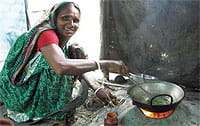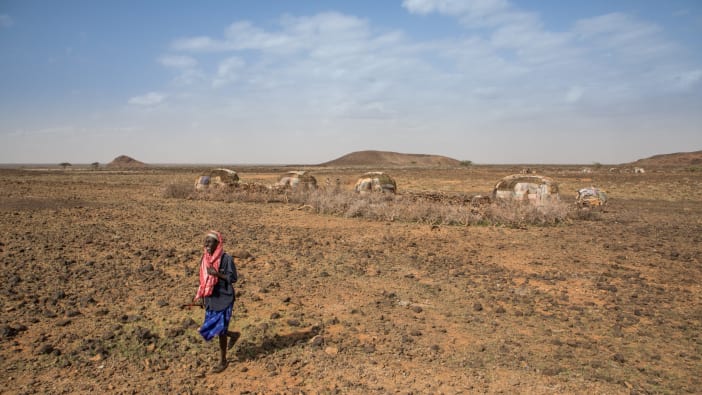Making sure that everyone in the family has enough to eat, and that the food is nutritious (Footsteps 65), is vital to maintain good health.
The way that food is stored and prepared is also important to prevent sickness.
- Wash hands well with soap and water before preparing food.
- Make sure all pans, dishes, knives and tools used in preparing food are clean.
- Keep uncooked meat and fish away from cooked foods.
- Cook meat thoroughly before eating.
- Serve food fresh. Do not leave cooked food to sit for too long before eating. Milk, fish, cooked meat and cooked rice will spoil quickly. If reheating cooked food, make sure it is thoroughly reheated.
- Flies carry disease, so always cover food to keep them away.
Safe water
Safe water is vital for health. One way to ensure water is safe to drink is to boil it. Boiling water will kill the germs that cause diarrhoea, and make the water safe. If fuel is scarce, it is possible to purify water by using sunlight (Footsteps 51 and www.sodis.ch).
Once water has been treated it must be kept clean. If water for drinking is stored, make sure the containers are clean and covered by lids to keep out flies and dust. Do not put your hands in the water but use a clean, long-handled cup or ladle to take the water out of the container to drink.
Preventing injuries
Try to prevent injuries from occurring.
- Keep all sharp objects such as knives, open tins and broken glass away from children.
- Keep matches and lamps out of the reach of children.
- Be careful when cooking, and do not let small children near the fire or near boiling water.
- Ensure that pot handles do not stick out from the stove, so that children cannot reach them.
- Teach children how to cross roads safely.
- Keep electrical items away from water to avoid risk of electric shock. Teach children not to touch electrical sockets.
- Do not drink alcohol to excess.
Preventing infection
Good hygiene and sanitation practices in the home will help prevent infection. For ideas about community sanitation see Footsteps 73.
- Do not let pigs or other animals come into the house or places where children play.
- If children or animals defecate near the house, clean it up at once. Teach children to use a latrine.
- Do not spit on the floor, and cover your mouth when you cough or sneeze.
- Ensure children are vaccinated. Vaccinations are usually free and give protection against many dangerous diseases. Seek advice from your nearest health centre.
- Treat infectious diseases as soon as possible to prevent them spreading to others.
- Do not go barefoot in areas where hookworm is common.
Article compiled by Maggie Sandilands using information from Where There Is No Doctor (2007 Revised Edition), by David Werner with Carol Thuman and Jane Maxwell, published by Hesperian. See Resources for details about how to order.
Home remedies
All over the world, people use different traditional cures. For many sicknesses, home remedies work as well as modern medicine, or even better. For example, many of the herbal teas that people use to treat coughs and colds or diarrhoea do more good and cause fewer problems than cough syrups and strong medicines that some doctors prescribe. Tea made from Neem tree bark will help bring fever down and stop pain. Neem seed oil applied to the body helps to keep mosquitoes away.
However, other home remedies are less effective and some may be harmful. Only use remedies if you are sure they are safe and know exactly how to use them.
Most serious sicknesses like pneumonia, tetanus, typhoid, tuberculosis, appendicitis, sexually transmitted infections, and fever after childbirth, should be treated with modern medicine as soon as possible.
When to seek medical help
Many illnesses and injuries can be treated in the home by a well-informed caregiver. However, there is a risk of missing something serious, or making a mistake and giving the wrong treatment, which could make the sick person worse. It is important to recognise when to seek medical help. If in doubt, or if the sick person’s condition does not improve or gets worse, seek help.
A person who has one or more of the following signs is probably too sick to be treated at home without skilled medical help. Their life may be in danger. Seek medical help as soon as possible.
- Loss of large amounts of blood from anywhere in the body
- Coughing up blood
- Blood in the urine
- Lips and nails turn blue
- Great difficulty in breathing, which does not improve with rest
- Cannot be wakened (coma)
- So weak they faint when they stand up
- A day or more without being able to drink any liquids
- A day or more without being able to urinate
- Heavy vomiting or severe diarrhoea that lasts for more than one day (or more than a few hours in babies)
- Black stools like tar, or vomit with blood in it
- Strong, continuous stomach pains with vomiting in a person who cannot have a bowel movement
- Stiff neck with arched back, with or without a stiff jaw
- More than one fit (convulsions) in someone with fever or serious illness
- High fever (above 39°C) that lasts more than four or five days
- Problems with pregnancy or childbirth such as:
- bleeding during pregnancy
- swollen face and trouble seeing in the last months
- long delay once the waters have broken and labour has begun
- severe bleeding.
Pregnant women should plan ahead in case there are complications with the birth. Think about the place of delivery and if this is at home, consider in advance arrangements for transport to a health centre in an emergency.
Adapted from Where There Is No Doctor (2007 Revised Edition), by David Werner with Carol Thuman and Jane Maxwell, published by Hesperian.









